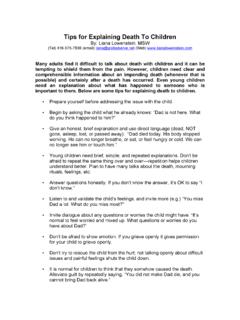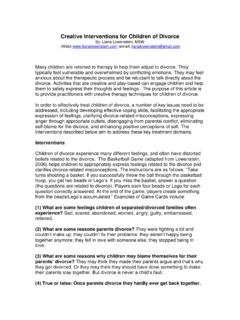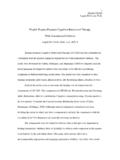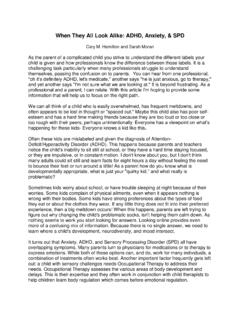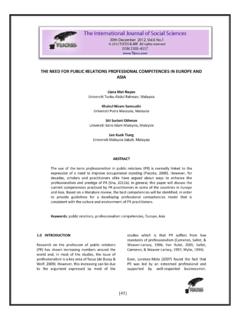Transcription of The Four Principles of Stress Management - Liana …
1 The four Principles of Stress Management By Michael Senko, LCSW C We all know Elmer the camel's story very well. You may not know his name, but you are aware of his story. And we are all very grateful that he had good health insurance and a good surgeon to help take care of his back. I am sure that there have been times in your life that you can identify with Elmer and empathize with his pain. I am also sure that you can identify the exact straw that broke your back too. It probably wasn't much different than Elmer's straw, except that it might have been more figurative. Seemingly small and insignificant, but with real consequences. Stress can be devastating when it is not handled in a healthy manner.
2 Unfortunately, it is part of life, but it doesn't have to break your back as it did Elmer's. If Elmer knew the following 4 Principles to handle Stress effectively, then he may have avoided such a costly medical bill. 1) We need to understand that thoughts and beliefs translate into emotions and feelings. Our internal dialog throughout the day is of our choosing. What makes this statement hard to believe is that we are not only thinking every second of the day, but that society has us trained to blame others for our emotions. You make me so happy. You make me so angry. Both of these examples identify that we are blaming others for how we feel. In order to be able to put the following Principles into action, it's important that we understand this concept.
3 Our internal dialog is based upon our unconscious beliefs. This means that our daily thinking has become habitual or conditioned. The more we think something, the more we believe it. Therefore, whatever we believe about our world around us contributes to what we tell ourselves over and over again. It becomes a perpetual feedback loop. The empowering message about this concept is that you have the choice of which feedback loop you enter. Either positive or negative, it's up to you. Thoughts then lead us to our emotional states. If you are thinking thoughts of cute puppies and giggling babies, then you are going to enter into a positive emotional state. If you are thinking about taxes and gas prices, you will more than likely enter into a negative emotional state.
4 If you are repeating the words relax and peace, you will probably find yourself entering into a state of calm. There is no way around it, we create our emotions. Our thoughts are inside of our heads and our emotions are inside of our bodies, so we have no choice but to own them. Therein lies the power of choice which sets up the rest of the process for effective Stress Management . But hold on, we're not done yet. Each emotional state, if focused on intensely enough, may become a physical feeling. When you are so moved to both sadness and despair, or to extreme joy, the body may express itself in tears. Where do you think the ideas of having a broken heart or feeling light on your feet come from?
5 These are direct illustrations of physical feelings associated with different thought processes and emotional states. Stress can be felt physically, and if unsuccessfully handled, it may lead to medical issues, substance abuse, or other health problems. 2) Put things into a healthier perspective. One piece of straw may weigh a fraction of an ounce, but a bunch obviously weighs more. If Elmer had the tools to be able to look at each straw as such, one fraction of an ounce, he may have been able to avoid injury. Now let's apply this theory to your situation. If you are athletic, you may be able to relate to the following example. A marathon is miles in length. To look at the entire distance in one glance, it is very overwhelming.
6 But if the distance is broken down into one mile increments or sectioned into goals of time, then the distance seems possible to accomplish. The only way to finish a marathon is to take it one step at a time. If you look at the big picture (work deadlines, bills and mortgages, etc) it can be incredibly overwhelming. It can be so overwhelming that it may be de moralizing. So, let's break down a goal into easier to manage tasks. I like to call these mini goals or objectives. Take stock in what is controllable and what is not controllable. What do you really have control over in any given situation? Reflecting back onto the previous principle, the only thing in life that we have control over is what we think about and how we act.
7 We do not have control over what others think or do. As the wise Dalai Lama once said, If you have fear of some pain or suffering, you should examine whether there is anything you can do about it. If you can, there is no need to worry about it; if you cannot do anything, then there is also no need to worry. Some questions to ask yourself to help put this principle into action are: In the grand scheme of life, where does this area of Stress reside? Is it the end of the world? It may feel like it, but is it truly the end of all mankind as we know it? Are you catastrophizing or fortune telling a negative outcome without a realistic basis? 3) Be aware of your expectations. Your expectations may be related to those that you have of yourself, those that you have of others, and those that others have upon you.
8 Since you now have the insight into your ownership of thought, then you now have the power to change it. When expectations are not met, we set ourselves up for negative experiences. In Elmer's case, he may have expected to be able to carry such a heavy load of straw. He may usually be self critical and feel the need to prove something to himself, thus setting himself up for failure. Assess how you believe others perceive you. Take a look at how you believe you need to be around others. What do you expect from them and from yourself? If you find that those expectations seem a bit high and may be generating Stress , then it is time to think of new expectations. Expectations, if created appropriately, are motivating.
9 If you find yourself de motivated, then look at the language in your expectations. If you find the word should, then you need to stop shoulding on yourself. Should is a command, and it is human nature to resist commands. If you find such a word in your expectation, then you will resist the expectation, thus setting yourself up for a negative experience. Replace should with may or could. Words that are more inviting and motivating. 4) Set healthy boundaries. There is nothing wrong with saying no. It takes strength for someone to identify their limits, so take pride in the ability to be able to identify yours. If you find yourself, like Elmer, with an overwhelming load of straw because you couldn't say no, assess where that is coming from.
10 We all want to be good helpers, the child inside of us is always eager to be told that they are good at something. But when we don't know how to say no, we get stressed out and angry with ourselves and with others. There is a difference with wanting to help and being self sacrificing. Self sacrificing is the need to help to the detriment of fulfilling your own needs. This comes from a deeper level of needing to be worthy. Such a belief leaves people feeling angry and empty because others will never be able to reciprocate to an acceptable level. It also leads to a perpetually higher level of Stress because your basic needs aren't being met while you are taking care of everyone else's needs.
